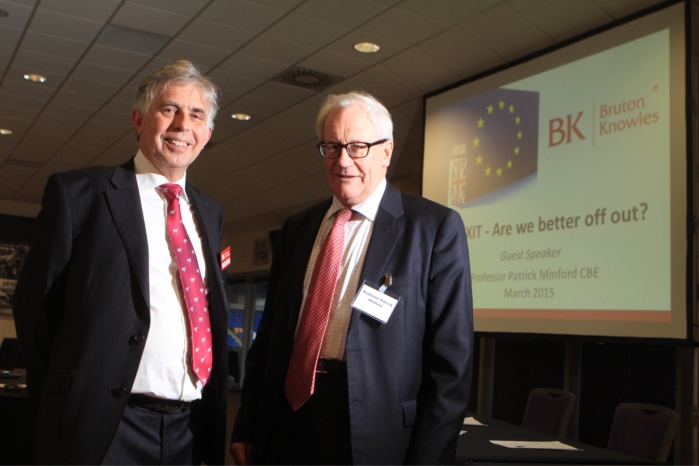Renowned macroeconomist Professor Patrick Minford CBE called for a radical ‘re-setting’ of Britain’s treaty with the EU during a keynote speech to Cardiff business people on Thursday (26th March).
The Professor of Applied Economics at Cardiff Business School detailed the pros, cons and costs of EU membership during an insightful and provocative talk, organised and hosted by property consultancy Bruton Knowles at Cardiff City Stadium.
Mike Rees, Head of Bruton Knowles’ Cardiff office, said Professor Minford’s talks are always well received by clients and key contacts and this subject was of particular interest given the forthcoming election.
He said: “The issue of our EU membership is a bit like a volcano, every now and again it erupts out. Whatever colour of Government we get next, the question will rise yet again. It will affect us all one way or another.
“At Bruton Knowles we have to look at the implications for the property market of these major Government decisions which are presently causing some uncertainty – a view also held by independent commentators.
“Always offering a persuasive argument, Professor Minford is known for his forthright views on the world economy and his chosen subject certainly prompted some enthusiastic exchanges with the audience!”
Professor Minford’s topics included ‘What are the likely consequences of leaving the EU’ ‘What are the risks if we remain a member?’ and ‘Can the UK operate outside the EU and still expect free trade agreements?’
Following lively questions from the audience of around 60 Cardiff business people, guests had an opportunity to network with colleagues from across the region.
Mike Rees concluded: “Professor Minford pinpointed the challenges of setting business free from costly regulation and protectionism, bail outs and the threat of stagnation. It was certainly an eye opener and gave colleagues a valuable insight into a number of potential European trade scenarios and the possible repercussions on business in Wales.”



















